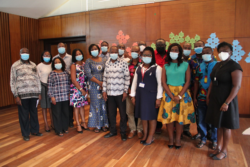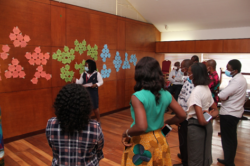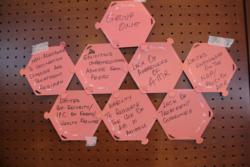National Stakeholder Workshop: Ghana
CE4AMR: The One Health Approach is an international collaboration of researchers aiming to consolidate learnings on how Community Engagement methods can be best utilised to tackle the global challenge of antimicrobial resistance (AMR). A key aim of this collaboration is to establish and strengthen networks of National stakeholders across each of the five host LMICs.
Between November and December 2020 project teams held a series of National Stakeholder Workshops (NSWs) aimed at firstly, to understand the local AMR challenges in each context and secondly, to identify spaces where Community Engagement approaches could support meaningful solutions to these challenges.
In this blog Professor Collins Stephen Ahorlu and Dr Emmanuel Tsekleves tell us more about their workshop in Ghana. Collins and Emmanuel currently work together on the Dust Bunny project which aims to develop an understanding of the home as a source of infection from Antimicrobial Resistance (AMR) bacteria carried by dust by exploring hygiene practices across different home environments in Ghana.

Participants arrive at the Noguchi Memorial Institute for Medical Research. Photo credit: Dust Bunny
They ran their National Stakeholder Workshop (NSW) in person at the Noguchi Medical Research Institute with 30 participants from different backgrounds. Some had experience in the One Health approach and others had not but had heard about it, interestingly, the latter were mostly from the Social Sciences background. The workshop delivered a series of activities and short presentations. Activities defined stakeholders for community engagement (CE), opportunities for CE and causes of antimicrobial resistance (AMR), and explored potential solutions in the use of One Health approach.

Workshop participants discuss Ghana's AMR challenges and priorities .Photo Credit: Dust Bunny
Participants recognised AMR as a major global problem, especially in LMICs where regulations are weak and poorly adhered to. A consensus was that community engagement could help promote self-regulations that may lead to rational use of antibiotics. They also suggested opportunities to involve Community Engagement to mitigate AMR challenge and have listed the following areas for considerations.
- Awareness creation through targeted education in human, animal and environmental health care beneficiaries and practitioners.
- Engaging the community through education on good environmental management. For example, proper waste disposal, general cleaning, communal labour.
- Infection prevention through the promotion of adequate waste disposal, handwashing, personal and home hygiene; STIs prevention etc.
- Prevention of abuse and misuse of antimicrobial drugs, especially antibiotics by reducing unnecessary demands, stop sharing antimicrobial drugs and compliance to dosage regimen both in humans and animals.
The Ghana National Action Plan on AMR was identified as a critical driver of AMR.

Workshop activities identified Ghana's National Priorities on AMR across the One Health Sphere. Photo Credit: Dust Bunny
The need to focus on this through public education, communities of practice and professionals’ education, update of treatment guidelines and reinforcement of regulatory laws was identified as critical to overcoming AMR challenges along with fostering collaboration between key stakeholders.
Take home message: AMR is a multi-sectoral global problem that requires concerted efforts in the context of one health to deal with. This, participants believe, will work better when coupled with CE involving ordinary community members as beneficiaries of interventions. CE also needs to engage professionals including animal health experts, human health experts, environmentalists, and researchers to build a community of practice for AMR-related attitudinal change.
By Collins Stephen Ahorlu and Emmanuel Tsekleves. Edited by Jess Mitchell
